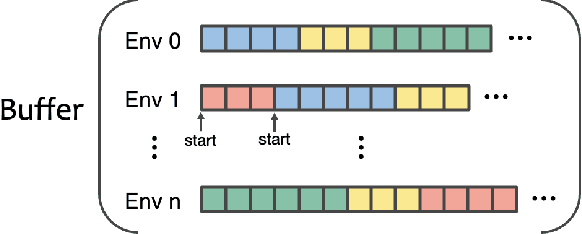Heng Tang
Bridging the Gap: Self-Optimized Fine-Tuning for LLM-based Recommender Systems
May 27, 2025Abstract:Recent years have witnessed extensive exploration of Large Language Models (LLMs) on the field of Recommender Systems (RS). There are currently two commonly used strategies to enable LLMs to have recommendation capabilities: 1) The "Guidance-Only" strategy uses in-context learning to exploit and amplify the inherent semantic understanding and item recommendation capabilities of LLMs; 2) The "Tuning-Only" strategy uses supervised fine-tuning (SFT) to fine-tune LLMs with the aim of fitting them to real recommendation data. However, neither of these strategies can effectively bridge the gap between the knowledge space of LLMs and recommendation, and their performance do not meet our expectations. To better enable LLMs to learn recommendation knowledge, we combine the advantages of the above two strategies and proposed a novel "Guidance+Tuning" method called Self-Optimized Fine-Tuning (SOFT), which adopts the idea of curriculum learning. It first employs self-distillation to construct an auxiliary easy-to-learn but meaningful dataset from a fine-tuned LLM. Then it further utilizes a self-adaptive curriculum scheduler to enable LLMs to gradually learn from simpler data (self-distilled data) to more challenging data (real RS data). Extensive experiments demonstrate that SOFT significantly enhances the recommendation accuracy (37.59\% on average) of LLM-based methods. The code is available via https://anonymous.4open.science/r/Self-Optimized-Fine-Tuning-264E
Distillation Matters: Empowering Sequential Recommenders to Match the Performance of Large Language Model
May 01, 2024



Abstract:Owing to their powerful semantic reasoning capabilities, Large Language Models (LLMs) have been effectively utilized as recommenders, achieving impressive performance. However, the high inference latency of LLMs significantly restricts their practical deployment. To address this issue, this work investigates knowledge distillation from cumbersome LLM-based recommendation models to lightweight conventional sequential models. It encounters three challenges: 1) the teacher's knowledge may not always be reliable; 2) the capacity gap between the teacher and student makes it difficult for the student to assimilate the teacher's knowledge; 3) divergence in semantic space poses a challenge to distill the knowledge from embeddings. To tackle these challenges, this work proposes a novel distillation strategy, DLLM2Rec, specifically tailored for knowledge distillation from LLM-based recommendation models to conventional sequential models. DLLM2Rec comprises: 1) Importance-aware ranking distillation, which filters reliable and student-friendly knowledge by weighting instances according to teacher confidence and student-teacher consistency; 2) Collaborative embedding distillation integrates knowledge from teacher embeddings with collaborative signals mined from the data. Extensive experiments demonstrate the effectiveness of the proposed DLLM2Rec, boosting three typical sequential models with an average improvement of 47.97%, even enabling them to surpass LLM-based recommenders in some cases.
EasyRL4Rec: A User-Friendly Code Library for Reinforcement Learning Based Recommender Systems
Feb 23, 2024



Abstract:Reinforcement Learning (RL)-Based Recommender Systems (RSs) are increasingly recognized for their ability to improve long-term user engagement. Yet, the field grapples with challenges such as the absence of accessible frameworks, inconsistent evaluation standards, and the complexity of replicating prior work. Addressing these obstacles, we present EasyRL4Rec, a user-friendly and efficient library tailored for RL-based RSs. EasyRL4Rec features lightweight, diverse RL environments built on five widely-used public datasets, and is equipped with comprehensive core modules that offer rich options to ease the development of models. It establishes consistent evaluation criteria with a focus on long-term impacts and introduces customized solutions for state modeling and action representation tailored to recommender systems. Additionally, we share valuable insights gained from extensive experiments with current methods. EasyRL4Rec aims to facilitate the model development and experimental process in the domain of RL-based RSs. The library is openly accessible at https://github.com/chongminggao/EasyRL4Rec.
 Add to Chrome
Add to Chrome Add to Firefox
Add to Firefox Add to Edge
Add to Edge